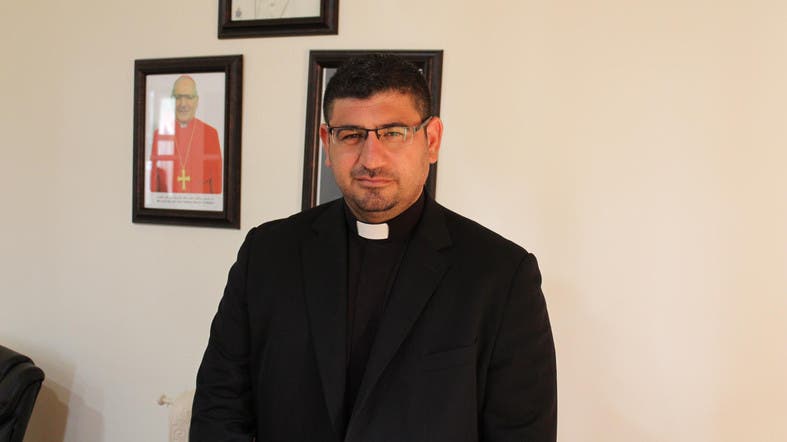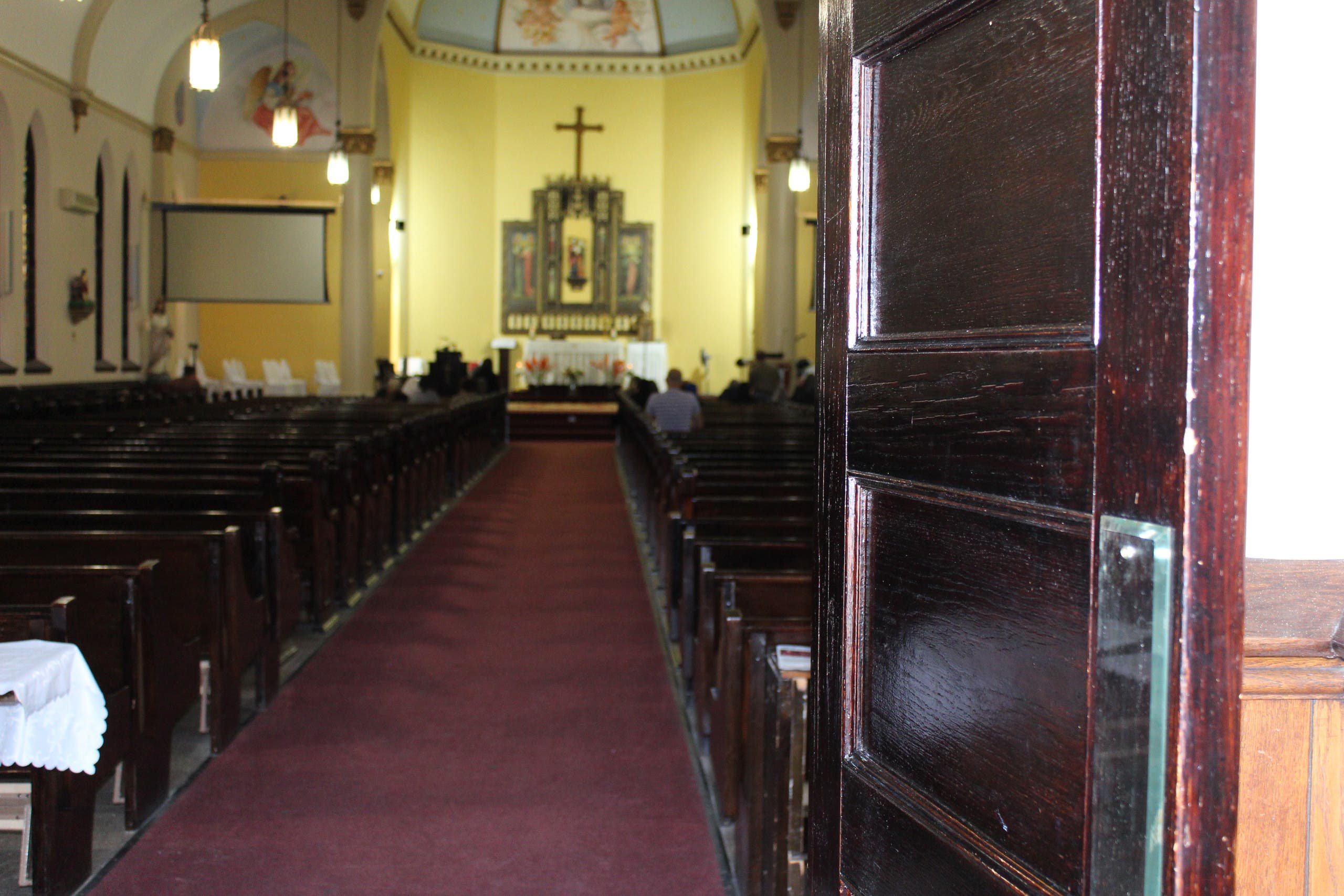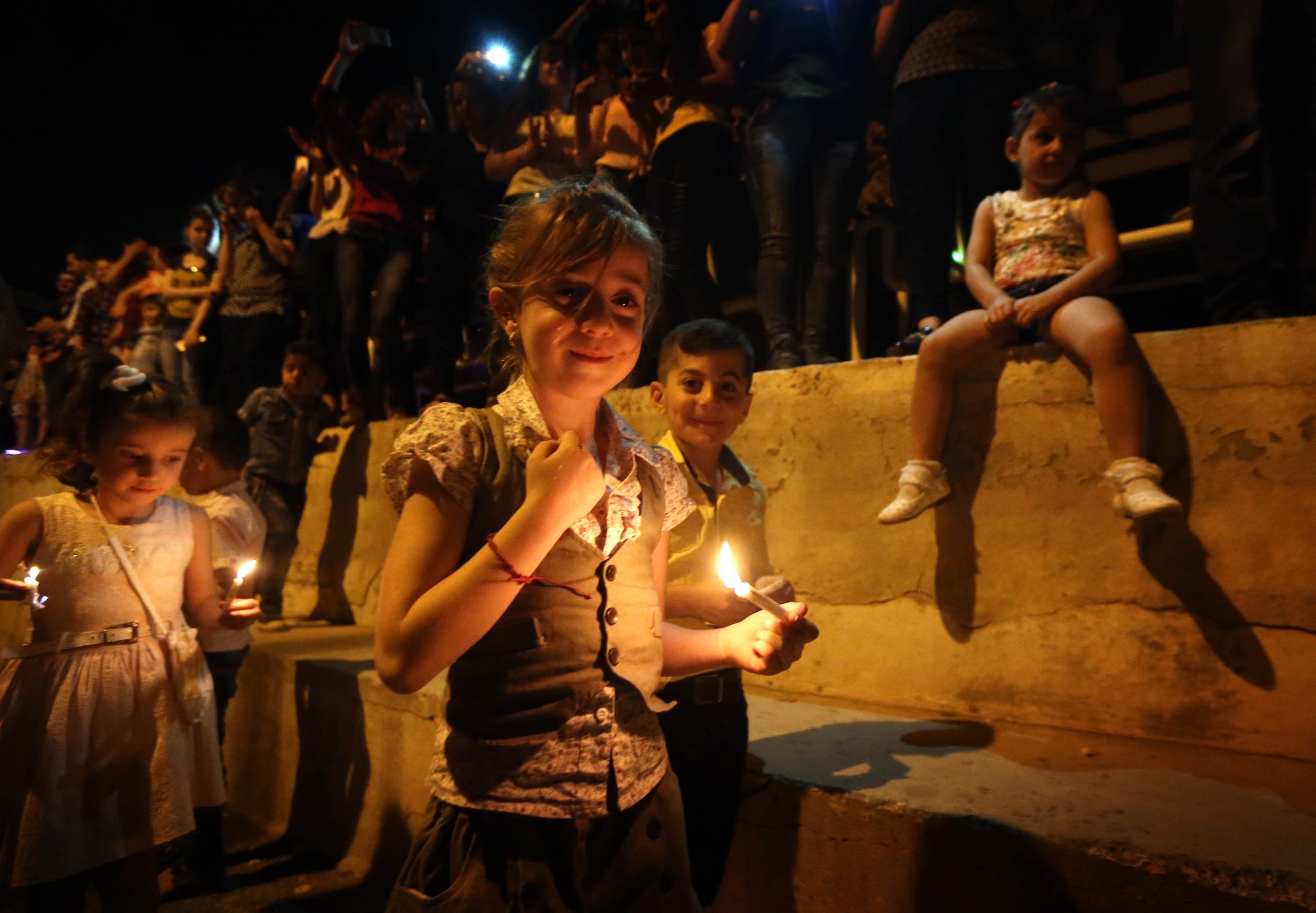 Father Sarmad Biloues says the Chaldean church has three million followers outside Iraq and almost one million in the country. (Photo: Dina al-Shibeeb)
Father Sarmad Biloues says the Chaldean church has three million followers outside Iraq and almost one million in the country. (Photo: Dina al-Shibeeb)
By Dina al-Shibeeb
Worshipers on Friday morning at the Holy Family Chaldean Catholic Church in the small Canadian city of Windsor can be heard praying in Arabic and, at times, in Chaldean, a neo-Aramaic language, still surviving in both Iraq and Syria.
In the church’s vicinity at Wyandotte Street, signs in Arabic on some grocery stores promise Canadian Iraqi customers – both Christians and Muslims – goodies, bread and other foodstuff that connect them to their motherland.
Far away, their country of origin, Iraq, might be on the verge of splitting off as the northern autonomous region of Kurdistan has scheduled a referendum on Sep. 25 to decide if it wants to secede.
Not all divorces are easy, particularly when it comes to the northern Nineveh Plain, a disputed region between Iraq’s Baghdad and Kurdistan’s Erbil among others, including the oil rich and mixed city of Kirkuk.
Baghdad considers the Nineveh Plains – heartland of Christianity in Iraq – where other minorities such as Yazidis and Shabaks live, as part of the northern Mosul governorate, while Erbil claims it after touting its Peshmerga troops as the main force behind the liberation of the area in late 2016 from ISIS militants, who seized the area in August 2014.
‘Every inch of my land’
“I am Father Sarmad, I am part of the Chaldean Catholic church, and we are the largest church in Iraq. I am part of Baghdad, I am part of [Iraqi southern city of] Basra, north of Iraq, and part of every inch of my land,” Father Sarmad Biloues from the church told Al Arabiya English when he was asked about the vote.
Father Biloues says the Chaldean church has three million followers outside Iraq and almost one million in the country. There is no recent official census but the number of Christians living in Iraq, who represented about seven percent of the population, fell from 1.4 million in 2003 to as low as 450,000 by 2013, due to ensuing violence following the US invasion.
Christians of the Iraqi original follow four churches – Chaldeans, who are Catholics, Assyrians, who follow Church of the East, Syriac Orthodox Church and Eastern Orthodox. By the look of things, they are in for a period of separation as well.
“All of Iraqi land lives in us. We are Iraqi citizens,” Father Biloues says. However, the Chaldean church leadership has not yet chosen an official position, he explained, highlighting Iraqi Christians’ caution over the messy business of impending separation.
“We are one heart with all of Iraq in Baghdad or Kurdistan,” he said. “We are waiting for our church leadership to choose the [final] stance. We always had Christians in Kurdistan and love Kurdistan, and we always had Christians in Baghdad and adore Baghdad.” He also urged everyone to be calm and asked “all Christians to pray for Iraq.”
“Peace must return, ISIS must be completely wiped, and reconciliation between all of Iraqis to be one heart and one land, and then we can sit on one table and decide,” he said, alluding that the separatist vote is way too early.
Oozing wounds
Juliana Taimoorazy, head of the Illinois-based Iraqi Christian Relief Council (ICRC), says they are having to lick their wounds, which are still oozing. “This is not the time for a referendum, she says”
“At ICRC we are doing our best to mobilize the Christian West and philanthropist to see the value to stand in unity and build their lives,” she says adding that they are a big fan of Iraq staying together. “Most of our people in Iraq and in the diaspora want Iraq to stay intact.”
One of the main reasons Christians feel part of Iraq is the country’s constitution article 125 of which mentions Assyrians and Chaldeans by their distinct ethnic names. The article also promises them their own province in the north even though these plans were stalled after ISIS ransacking, Taimoorazy says.
War nervousness
With Turkey and Iran already having large number of Kurdish separatists, Iran’s Chief of Staff, Major General Mohammed Bagheri, himself met with Turkish President Recep Tayyip Erdogan in August, urging Kurdistan to abandon the vote.
“We are nervous. Iran is not interested in this referendum, Turkey is trying to stop it, US is not supporting it, [President of the Iraqi Kurdistan Region Masoud] Barazani is trying to force it,” she said. “We are worried, if this goes through, we will be subjected again to another war that will be by Turkey or Iran attacking the Kurds.”
On top of the regional lack of support, onlookers find the Kurds as not only divided but facing financial difficulties amid dwindling oil prices that affected the whole of Iraq, leaving government employees in quagmire. However, sources told Reuters that Iraq’s Kurdistan has borrowed funds from its oil buyers to help settle a $1 billion London court case ahead of the vote.
“It is a scandal and a project by Barzani to expand the [Kurdistan Regional Government] KRG, not make it independent,” Max J. Joseph, a London-based Assyrian artist and writer, told Al Arabiya. “The Barzani family knows independence will mean another Kurdish civil war as well as a wider regional conflict.”
Christian protesters warned
With Assyrians in Iraq, and in the diaspora, “overwhelmingly preferring to have a direct relationship with Baghdad,” they made their voice heard when they protested in late August at the mainly Christian village of Alqosh in the Ninveh Plain, Joseph said.
However, they received a warning by the Kurdistan Democratic Party (KDP) dominated provincial council over their “illegal protests,’ Joseph shared on his Twitter account through his local sources whom he hid their names for security reasons.
“Assyrians in Alqosh have protested three times now waving Iraqi flags, but Baghdad is neglecting them so far and not helping. We’re desperate for Baghdad to play a more active role in our affairs but so far there has been very little,” he wrote.
In July, the Nineveh Council dismissed the mayor of Alqosh and replaced him with a local political leader close to the Barazani-led KDP. “The only ones who voice support for Kurdistan are the ones on the KDP payroll – and they are very few, but are strategically placed by the KRG in the media to voice that support which doesn’t exist on the ground.”
Nineveh Plain
There is also no concrete agreement among Christians on what is the best path to take particularly on the final status of their ancestral Nineveh Plain.
While the Chaldean Church does not have a firm position on upcoming referendum for its followers to adhere, it has agreed that Christians should not be “trapped” in the Nineveh Plain since violent past has taught Christians not to be in one place to be an easy prey,” said Father Biloues.
“We see it as conspiracy to put Christians in Nineveh Plain, in a country that has scared people. We are scared to be put in this prison,” he said. He recalled the Simele massacre in 1933. He also described a deceitful tactic by the British of encouraging Christian rebellion and later informing the Iraqi government to quell it. This led to the death of 3,000 Christians.
Father Biloues also rejects any calls for international protection or observation. “The Iraqi political situation is still not stable, and I expect the whole Iraqi nation to be in turmoil. If I say only Christians are facing persecution, yes I can say that but that’s not right because everyone is persecuted in Iraq,” he said.
Unlike him, Taimoorazy said: “We want an international observation to keep an eye both on Baghdad and Erbil to protect rights of minorities such as Christians, Yazidis and Turkmens.”
“Our issue is not so much as Christians but as nationality, as Assyrians, Chaldeans and Syriac, we are all one nation, we are having an issue with KRG,” she said, further complicating the situation.
“Especially the Assyrians have been asking for our rights to be observed as indigenous people of the land, and for us to have equal say in our fate, we do not want the Nineveh plain to be slated to go with Kurdistan.”
http://english.alarabiya.net/en/perspective/features/2017/09/06/As-Kurdistan-referendum-looms-Iraqi-Christians-redefine-positions.html

 There is no recent official census but the number of Christians living in Iraq. (Photo: Dina al-Shibeeb)
There is no recent official census but the number of Christians living in Iraq. (Photo: Dina al-Shibeeb)
 Displaced Iraqi Christians take part in celebrations on October 18, 2016 in Arbil, to mark the liberation of Qaraqosh, which was overrun by ISIS in August 2014. (AFP)
Displaced Iraqi Christians take part in celebrations on October 18, 2016 in Arbil, to mark the liberation of Qaraqosh, which was overrun by ISIS in August 2014. (AFP)
